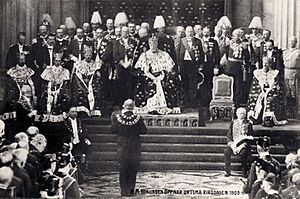History of the Riksdag facts for kids

The Riksdag is the national parliament of Sweden. A parliament is a group of people who make laws for a country. When the Riksdag started in 1866, Sweden did not yet have a full parliamentary system. This means the King still had a lot of power.
The parliaments in Estonia and Finland are also sometimes called Riksdag in Swedish.
Contents
The Old Riksdag
The Riksdag we know today grew from an older assembly called the Riksdag of the Estates. This old assembly had roots in ancient Viking meetings.
Many people believe the first Riksdag meeting happened in 1435 in the city of Arboga. At first, only three groups were likely there: the nobles, the church leaders (clergy), and the townspeople (burghers).
Later, in 1527, King Gustav I of Sweden made it official. He included representatives from all four main groups, or "estates," in Swedish society. These groups were:
- The nobility (rich families with special titles)
- The clergy (church leaders)
- The burghers (people living in towns, often merchants)
- The peasantry (farmers and people living in the countryside)
Under a law from 1809, the Riksdag of the Estates shared power with the King.
The New Riksdag
In 1866, the old Riksdag of the Estates changed. It voted to create a new Riksdag. This new Riksdag was a political assembly with two groups, or "chambers." Members of these chambers were chosen in national elections.
This was a big change because citizens could now vote. Before, your right to vote depended on which "estate" you belonged to. Now, it depended on how much money or property you had. This was called "census suffrage."
Even with these changes, the way the government worked didn't change much at first. The King still shared power with the Riksdag, just like before.
How Sweden Became More Democratic
From the late 1800s to the early 1900s, Sweden changed a lot. More people wanted to be involved in politics. This led to more people being able to vote. It also helped political parties grow and become stronger.
Because of this, the Riksdag started to have more power than the King. The Riksdag successfully pushed for a system where the government had to have the support of the parliament. This is called a parliamentary system. It meant the King could not keep a government in power if the Riksdag disagreed.
The last time a King tried to go against the Riksdag was in 1914. This event is known as the Courtyard Crisis. King Gustav V gave a speech that caused the Prime Minister, Karl Staaff, and his government to resign.
However, after elections in 1917, the King had to choose a government that had the support of the Riksdag. This new government's main job was to make changes to the constitution.
By 1907, all adult men in Sweden could vote. Women gained the right to vote in the 1921 general election.
Changes to the Constitution
In the 1960s, people in Sweden talked a lot about changing the country's constitution. A big question was whether Sweden should keep its monarchy. This discussion made it hard to agree on changes for a long time.
Finally, in 1970, a big change to the Riksdag was agreed upon. The Riksdag changed from having two chambers to having just one. This single chamber would have 350 members, all chosen by direct election.
However, in the next election, the government and the opposition each had 175 members. This meant votes were often tied! To solve this, the Speaker of the Riksdag sometimes had to draw lots (like a lottery) to decide. Because of this, in 1974, it was decided that the number of seats would be reduced to 349 from 1977 onwards.
The Riksdag Today
In 1974, a new Instrument of Government was created. This is a very important part of Sweden's constitution and how its government works.
The monarchy was kept, but the King or Queen lost all their formal political power. The monarch became only a symbolic head of state. Many of the traditional jobs of the head of state were given to the Speaker of the Riksdag.
See also
- Government of Sweden
- Politics of Sweden
 | Selma Burke |
 | Pauline Powell Burns |
 | Frederick J. Brown |
 | Robert Blackburn |

